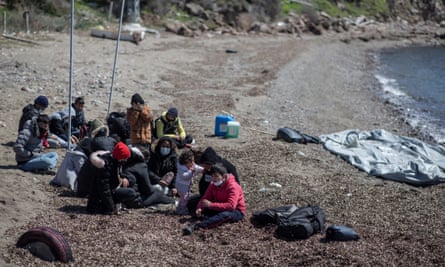Informal cooperation between states has prevented thousands of women, men and children from seeking protection in Europe this year, according to a report released by nine human rights organisations.
The Protecting Rights at Borders (Prab) initiative has recorded 2,162 cases of “pushbacks” at different borders in Italy, Greece, Serbia, Bosnia-Herzegovina, North Macedonia and Hungary carried out on the basis of bilateral agreements between countries, which resulted in them circumventing their responsibilities and pushing unwanted groups back outside the EU.
The report comes as Greece was also singled out for criticism on Wednesday with Europe’s top human rights watchdog urging a halt to the practice of pushing back migrants at the land and sea borders it shares with Turkey.
In a damning letter, the Council of Europe’s commissioner for human rights, Dunja Mijatović, said it was incumbent on Athens’ centre-right government to properly investigate the pushbacks. “I am deeply concerned that, two and a half years later, allegations of pushbacks persist,” she wrote, referring to an initial visit in which the issue had been raised.
“The way in which these operations are reportedly carried out would clearly be incompatible with Greece’s human rights obligations,” she said.

The commissioner said that, all too often, the official reaction of Greek authorities was to simply dismiss the charges, despite what she described as “the overwhelming body of evidence that has been presented in recent years”.
But issuing its strongest rebuttal yet, Athens responded by insisting that the police and coastguards were instructed to act “in full compliance” with Greece’s international obligations both at sea and along the border with Turkey at the Evros River (also known as Maritsa or Meriç), where Greek officials work closely with Frontex, the European border agency.
Alleged incidents of ill-treatment were not only investigated but punished, the Greek ministers of migration, civil protection and shipping claimed in a joint letter rejecting the accusations. “Greek officers continuously perform their duties against the backdrop of an unfavourable environment of intended misleading information, emanating in most cases from the smugglers’ networks,” they wrote, adding that the claims were aimed at both “harming their reputation and demoralising them”.
Last week, a Guardian analysis revealed EU member states illegally pushed back at least 40,000 asylum seekers from Europe’s borders during the pandemic, methods being linked to the death of more than 2,000 people.
Prab, which includes the Danish Refugee Council (DRC), Italy’s Association for Juridical Studies on Immigration (ASGI) and Diaconia Valdese (DV), the Hungarian Helsinki Committee and others, said that “over a third of pushbacks were accompanied by rights violations (denial of access to asylum procedure, physical abuse and assault, theft, extortion and destruction of property), at the hands of national border police and law enforcement officials”.
According to the testimonies collected by Prab, people attempting to cross or having just crossed the border between Italy and France also often report “rights violations by French law enforcement officials. After being intercepted by French border police along the coastal border, asylum seekers are detained for the night at the police border station, denied their right to apply for asylum, receive insufficient food and water, and are not provided with interpretation or medical assistance.” The next day they are returned to Italy.
Prab has also documented the return of asylum seekers and migrants across Italy’s north-eastern land border with Slovenia, described as “one of the most visible occurrences of pushbacks in the EU”, due to a flawed agreement signed between Italy and Slovenia in 1996, when the two countries agreed on the return to a third country of nationals entering Italy irregularly.
In July 2020, during a parliamentary hearing in Rome, an Italian representative of the interior ministry confirmed that pushbacks were happening “without any sort of formal administrative procedure … even when the intention of requesting international protection was manifested”.
In January, the court of Rome declared more than 700 pushbacks perpetrated by Italian police in Slovenia illegal.
Refugees and migrants reporting pushbacks to Serbia complained of poor treatment of different types, while every other incident from Romania alleged violence. In two cases from Hungary, refugees testified that they had been bitten by border patrol dogs.

Interviewees reported being slapped, kicked, beaten by police using batons, and punched on their backs, hands and legs.
In 2021, more than a third of people pushed back from Croatia to Bosnia claimed they were physically abused, while 62% alleged theft, extortion or destruction of their personal belongings. Denial of access to asylum was reported by 23% of those interviewed.
Prab said that “chain pushbacks through different EU member states are occurring entirely outside of formally established mechanisms and aim to circumvent their obligations under European and international human rights law”.
Since the beginning of the year, 22 people reported experiencing pushbacks from Serbia to North Macedonia and from North Macedonia to Greece. Field reports and data from key informants gathered by the Macedonian Young Lawyers Association (Myla) show that as many as “4,000 persons may have experienced pushbacks to Greece during the first three months of 2021”.
Destruction of personal documents is also commonly recorded. There were testimonies from a group of migrants from Morocco who said they were beaten and forced into the Evros River on the Greek-Turkish border.
“It is extremely worrying to see that so many people experience pushbacks and border violence,” said Charlotte Slente, the DRC secretary general. “It goes without saying that states must stop the violence and these illegal practices, and perpetrators must be held accountable.
“To avoid the continuation of such illegal practices, DRC and its partner organisations strongly recommend that an independent border-monitoring mechanism is set up to ensure that rights violations are monitored and that effective investigations into evidence submitted by civil society actors are conducted.”
Prab said its report was “the tip of the iceberg”, as many rights violations were likely to go unreported.
